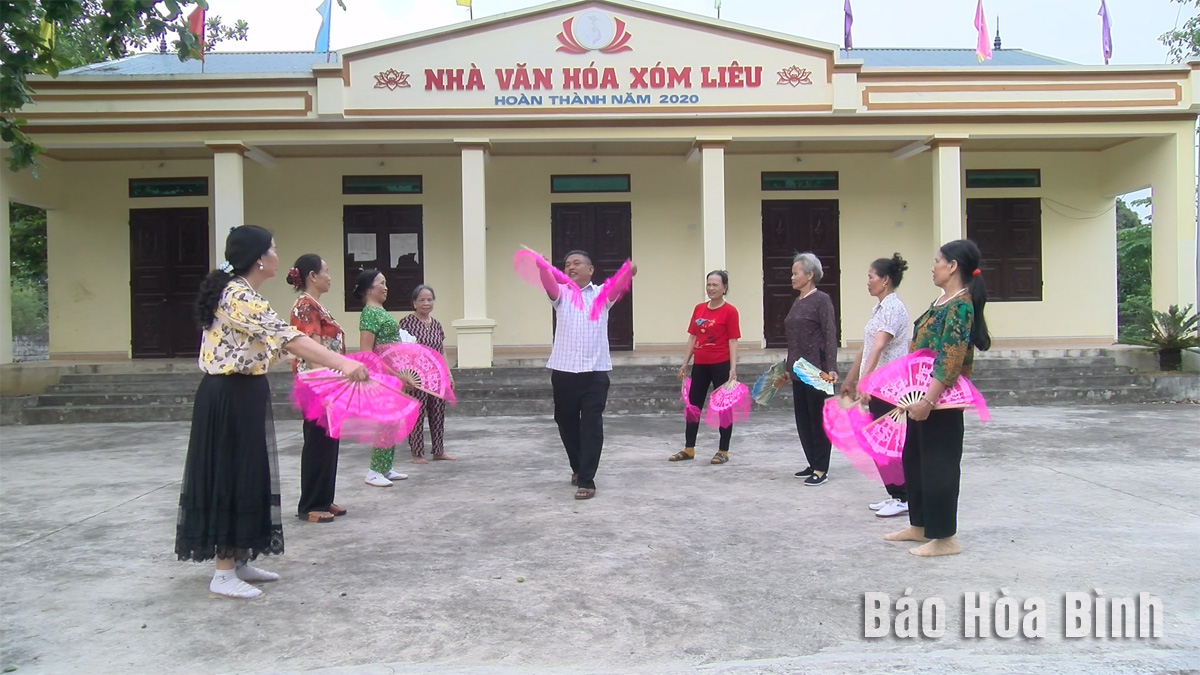
Born and raised in Lieu hamlet, Ngoc Luong commune, Yen Thuy district - a village rich in cultural tradition, from an early age Mr. Quach Cong Son was immersed in Cheo singing melodies. Therefore, although life is still difficult and difficult, Mr. Son is aware of the need to preserve the unique cultural values of his homeland. The passion for folk melodies continues to grow in his soul.
Mr. Quach Cong Son is guiding the members of Ngoc Luong Cheo singing club (Yen Thuy) to practice.
Introduced to the area in the 70s of the last century, Cheo singing has become an indispensable spiritual dish of the people in Yen Thuy district. To preserve and develop the art of Cheo in the locality, Mr. Son sought out the elders in the village and commune to restore.
and establish the "Ngoc Luong Cheo Club”, whose members are not only the people in the commune, but they are also in the other communes in the district inside and outside the province. He recorded each ancient Cheo singing for the club members to practice. In addition, he actively composed, arranged, and directed Cheo plays to participate in competitions, festivals at the levels of the district and province.
Mr. Quach Cong Son, the Chairman of Ngoc Luong Cheo Club says: "I am often invited by the government to be a director for Cheo performances to participate in competitions and fesstivals the levels of the district and province. Every time we participate there are also prizes. Ngoc Luong Cheo Club was also able to perform at the Central Government. This shows that the quality of the club's activities is increasingly improving, winning the love of the audience.”
The early days of establishing the club met many difficulties. Mr. Son had to travel everywhere in the commune, the district, and even outside the province to mobilize members to join the club. At that time, there weren't many people who knew how to sing Cheo, and there were even fewer people who knew how to play traditional musical instruments. After gathering a full team and being able to practice Cheo singing, the club encountered the difficulties due to not having a place to practice. Mr. Son discussed with his family to build and renovate his house into a cultural space, it was not only a place for the club to practice but it was also a place where folk music exchanges organized by Cheo club regularly took place.
Meeting Mr. Dang Duy Thien from Yen Tri commune (Yen Thuy), a member of Ngoc Luong Cheo club says: "With the passion for Cheo singing combined with the enthusiasm of the club leader, Mr. Quach Cong Son, convinced and motivated us to join the club. We have been participating in the club for nearly 5 years. We hope that Mr. Son will continue to develop his love for Cheo singing even more and develop Ngoc Luong Cheo Club to develop.”
More than 20 years of working in the job of "having meals at home, carrying social work” is a long time for Mr. Son to devote all his heart to the art of Cheo. Therefore, the reputation of Ngoc Luong Cheo Club is not limited to the district, in the province, but it has also been performing at the Central level. Thanks to long-term maintenance and the enthusiasm of the club members as well as Mr. Son personally, the singing of Cheo club is increasingly flying higher and farther.
Everything Mr. Quach Cong Son does to preserve Cheo singing is voluntary. He has the right to be proud of being the person who has contributed to preserving and developing the art of Cheo in Yen Thuy district. Currently, his greatest wish is that all levels and branches pay attention and support to continue maintaining Ngoc Luong Cheo Club, developing the art of Cheo, so that Cheo singing live forever in the hearts of the people.
Phong Phu commune, Tan Lac district of Hoa Binh province, is widely regarded as the cultural heartland of the Muong ethnic group. Among its many traditional communities, Luy Ai hamlet (formerly Ai hamlet) stands out as a rare location where the customs and way of life of the Muong Bi people remain largely intact.
The Truong Kha temple festival, a distinctive cultural event held every three years in Vu Ban township, Lac Son district, returned recently with vibrant rituals and folk traditions of the Muong people. Located next to the Buoi River in the Muong Trao fields, the Truong Kha Temple is dedicated to the three Kun Dol deities, revered for teaching farming techniques, irrigation, weaving, and protecting the harvest.
The demand for spaces serving community activities of residents in various areas across Hoa Binh city has been satisfied as local cultural houses now feature modern, spacious facilities thanks to the effective implementation of Resolution No. 49/NQ-HDND issued on December 28, 2021 by the city People's Council, which approved the plan for reorganising, converting, and allocating land for the construction, repair, and expansion of cultural houses in Hoa Binh’s villages and residential areas until 2025.
At the end of May, the Hoa Binh Provincial Ethnic Arts Troupe organized a series of performances for residents in Region 2 and Region 3 communes across the province. Bringing art to ethnic communities in remote, isolated, and especially disadvantaged areas has become a meaningful activity. These are not merely artistic performances but also journeys to disseminate cultural values, enrich spiritual life, and contribute to preserving the cultural identity of ethnic minorities.



